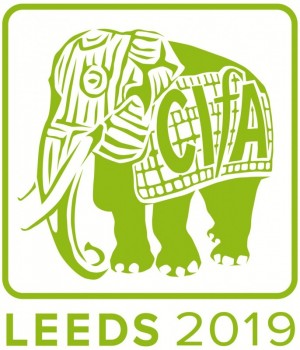CIfA2019 Archaeology: values, benefits, and legacies - Annual training event and conference
24 to 26 April 2019, Royal Armouries Museum, Leeds
Theme

Our theme for the 2019 conference will provide a forum for delegates to discuss and explore ideas around social value, public benefit, and the creation of knowledge. It offers the opportunity to think about legacy and how the work we undertake now will impact on future generations – from inspiring future careers to learning lessons from our failures. We also want to consider how a multitude of stakeholders - archaeologists, policy makers, clients, the public - value our discipline: financially, politically and intellectually and to think about how effective we are in communicating that value through the stories we tell.
Venue
We are very excited to be able to hold CIfA2019 at the Royal Armouries Museum in Leeds. The museum is one of three the Royal Armouries has across the United Kingdom and cares for one of the most important national collections of arms and armour in the world. More information about the museum can be found using the links below
Final conference programme and timetable
Session abstracts
| Friday, 26 Apr | Breakout sessions |
|---|---|
| Session 13 | Offshore development: creating a legacy for marine archaeology (Abstract) |
| 13.1 | Dead Man's Chest: Historic Environment Data Archive Centres and MEDIN (Marine Environmental Data and Information Network) Peter McKeague and Katie Green |
| 13.2 | Across and beyond site boundaries: maximising the legacy of commercial submerged palaeolandscape investigations Claire Mellett |
| 13.3 | Where the wind blows: A Curators Perspective on the public benefit from offshore wind developments Pip Naylor |
| 13.4 | Introduction to afternoon session Victoria Cooper |
| 13.5 | Offshore Legacies: are we making the most of the marine development dividend? Antony Firth |
| Session14 | An archaeological inspiration: inspiring creative responses to understanding the past and shaping the future (Abstract) |
| 14.1 | Inspiring and experiencing at the London Mithraeum Sophie Jackson |
| 14.2 | From find to ind: how can we transform archaeology into cultural capital Neil Redfern |
| 14.3 | Rethinking the perception of magic and rituals in archaeological contexts Debora Moretti |
| 14.4 | Managing interpretation on HMS Victory Rosemary Thornber |
| 14.5 | Creating archaeology: practice, process, purpose Gavin MacGregor |
| 14.6 | Drawing on the coast – art, archaeology and future legacies Lara Band and Sarah Colbourne |
| 14.7 | Making a great place: How the creative arts can enhance the heritage experience Megan Clement and Dominic Somers |
| Session 15 | Communicating the values of archaeologists to detectorists and embedding metal detecting into professional practice (Abstract) |
| 15.1 | Where to detect? A review: metal detector surveys on developer-funded investigations Stewart Bryant |
| 15.2 | Structured, supervised metal detecting surveys as technique for investigating Vicky Nash |
| 15.3 | A tale of two cities: metal detecting policy, municipalities and heritage Kiara Beaulieu |
| 15.4 | The current state of hobbyist metal detecting in Scotland - Where do we go from here? Warren Bailie |
| 15.5 | Making Metal-Detecting Great (Again)? Michael Lewis |
| 15.6 | First contact - full bloom Alan Standish |
| 15.7 | Metal detecting and local authority archaeology services Toby Catchpole |
| Session 16 | CIfA Standards and guidance workshop |
Accessibility
If you have any accessibility needs or concerns, please view our full conference accessibility page for information and important contacts.
Harassment-free conference
CIfA2019 is committed to providing a harassment-free conference experience for everyone. Please see our policy statements as well as BAJR's respect guide. To report harassment on-site, please contact Alex Llewellyn at the registration desk or via email at admin [at] archaeologists.net.

